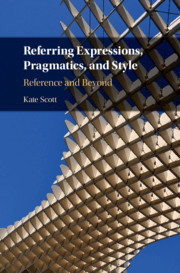Book contents
- Referring Expressions, Pragmatics and Style
- Referring Expressions, Pragmatics and Style
- Copyright page
- Dedication
- Contents
- Acknowledgements
- 1 Reference and Meaning
- 2 Relevance, Reference and Procedures
- 3 Pragmatic Activation Accounts of Reference and Referring
- 4 Definite Descriptions and Definite Procedures
- 5 Pronouns and Sub-personal Procedures
- 6 Null Referring Expressions
- 7 Demonstratives
- 8 Reference and Beyond
- References
- Index
6 - Null Referring Expressions
Published online by Cambridge University Press: 18 October 2019
- Referring Expressions, Pragmatics and Style
- Referring Expressions, Pragmatics and Style
- Copyright page
- Dedication
- Contents
- Acknowledgements
- 1 Reference and Meaning
- 2 Relevance, Reference and Procedures
- 3 Pragmatic Activation Accounts of Reference and Referring
- 4 Definite Descriptions and Definite Procedures
- 5 Pronouns and Sub-personal Procedures
- 6 Null Referring Expressions
- 7 Demonstratives
- 8 Reference and Beyond
- References
- Index
Summary
Chapter 6 applies the relevance-based account of referring expressions to the phenomenon of null subjects in non-pro-drop languages. So-called diary-style nulls, it is argued, are ultimately driven by the interaction of effects and effort and therefore by the speaker’s aim of achieving optimal relevance. Three broad categories of null subject use in English are identified: an informal null subject where the omission leads to extra cognitive effects, a pressurized null subject where the speaker’s abilities are the crucial factor, and finally, an ostensively vague null subject, which is driven by the speaker’s preferences. These three categories are not presented as an exhaustive taxonomy of English null subjects, or as theoretically distinct. Rather they emerge as a result of a speaker aiming at optimal relevance in different discourse contexts, and they represent occasions where different elements in the overall equation of optimal relevance drive lexical omissions.
Keywords
- Type
- Chapter
- Information
- Referring Expressions, Pragmatics, and StyleReference and Beyond, pp. 114 - 129Publisher: Cambridge University PressPrint publication year: 2019

